Key takeaways:
- Genealogy testing reveals unexpected family connections and can shape personal identity through an exploration of ancestry.
- Health insights and a sense of belonging are significant benefits of genealogy testing, enhancing understanding of one’s heritage.
- Different types of tests (Y-DNA, mtDNA, and autosomal) provide varied perspectives on ancestry, each with unique insights.
- Preparation is crucial for genealogy testing, including understanding motivations, familiarizing with the process, and gathering family history information.
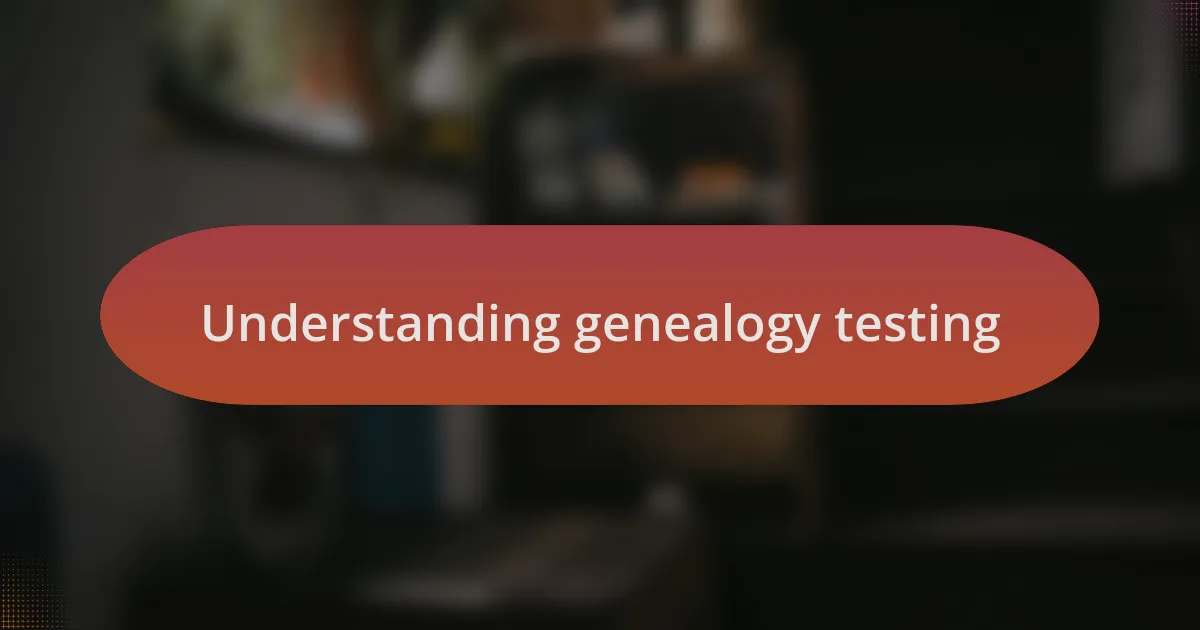
Understanding genealogy testing
Understanding genealogy testing can feel like opening a treasure chest filled with stories from the past. When I first dived into testing, I was amazed at the connections that emerged, linking me to individuals I never knew existed. Have you ever considered how a simple test could reveal unexpected branches of your family tree?
The range of testing types—autosoma, Y-DNA, and mtDNA—can initially be overwhelming. Each test serves a different purpose, like different lenses through which to view your ancestry. Personally, the results from my autosomal test opened my eyes to regions of the world I never imagined my ancestors roamed. Isn’t it interesting to think about how identity is shaped not just by where we live but by our deepest roots?
I remember the moment I discovered a distant cousin through a DNA match; it felt like discovering a long-lost friend. This experience made me realize that genealogy testing is as much about connections and community as it is about names and dates. How has your journey through genealogy shaped your understanding of who you are today?
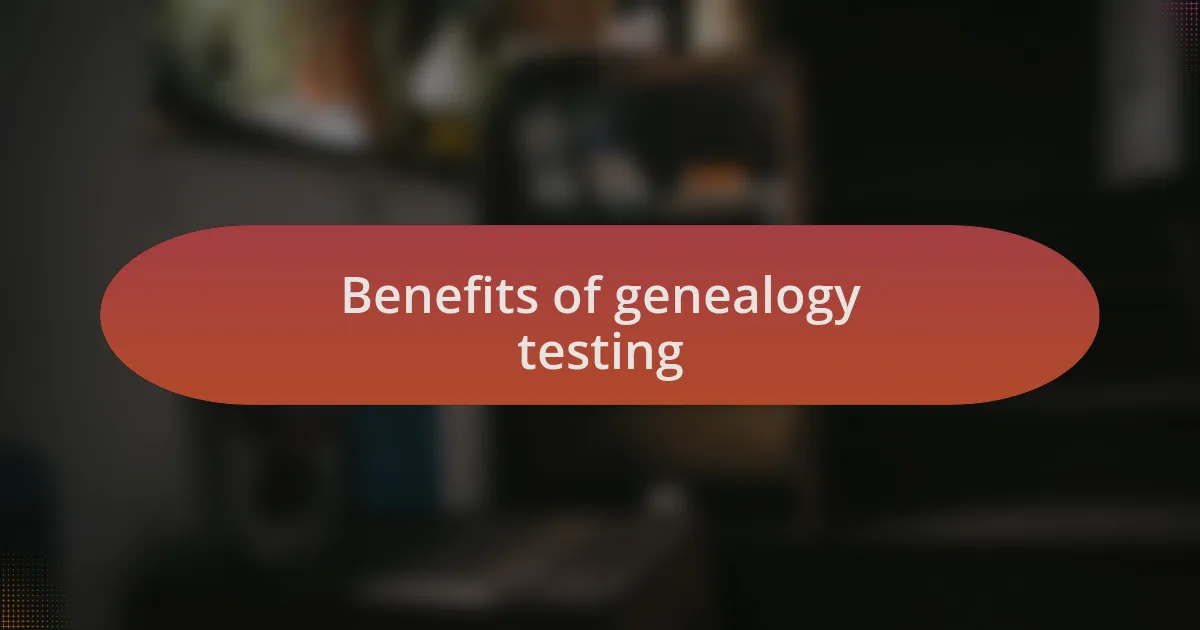
Benefits of genealogy testing
The benefits of genealogy testing are profound and can transform our understanding of identity. I vividly recall uncovering health-related insights that ran in my family, information that came as a surprise but was incredibly valuable. Have you ever thought about how knowing your genetic predispositions could help you make informed lifestyle choices?
Another remarkable benefit is the sense of belonging that genealogy testing can foster. When I connected with a branch of my family I had never known, it felt as though a piece of my identity had clicked into place. It raised the question—how much do we truly know about our heritage, and what stories are waiting to be uncovered?
Additionally, genealogy testing can bridge generational gaps. I often think back to the conversations I had with my grandparents and how their experiences shaped my family narrative. When I shared my results with them, their excitement ignited a passion in me to explore more—what stories might your family hold if you brought them into the discussion?
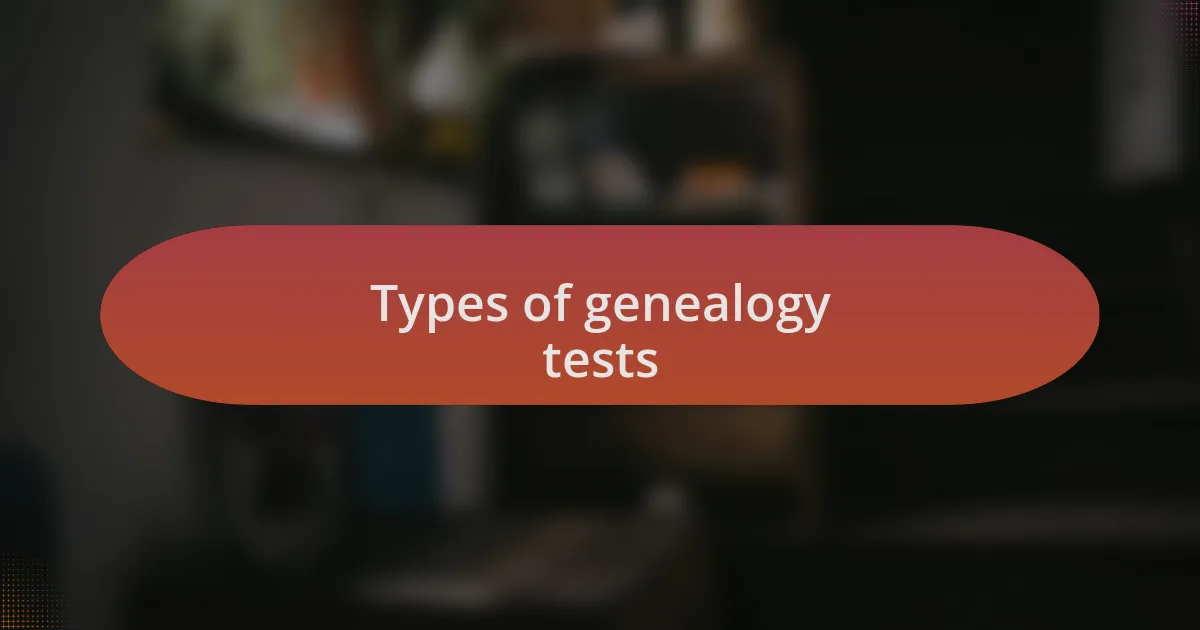
Types of genealogy tests
When it comes to genealogy tests, several types can provide unique insights into your ancestry. The three primary categories include Y-DNA, mtDNA, and autosomal DNA tests. My first encounter with Y-DNA testing opened a door to my paternal lineage that I hadn’t anticipated, as it traces direct male descendants. Have you ever found yourself curious about who your paternal ancestors were? It’s a powerful experience to see those connections laid out.
Autosomal DNA tests are perhaps the most popular among beginners, as they give a broader overview of your genetic makeup from both sides of your family. I remember eagerly opening my results to discover branches of my family tree that extended much further than I imagined, highlighting fascinating regional ties. Have you thought about what surprises your genetic background might reveal?
On the other hand, mtDNA tests specifically analyze the maternal lineage, providing a unique perspective on one’s ancestry. The moment I learned about my maternal roots, I felt an instant connection to women in my family long gone, sparking vivid imaginations of their lives. It’s astonishing how a simple test can inspire us to learn more about those who came before us—what stories might they tell if they could?
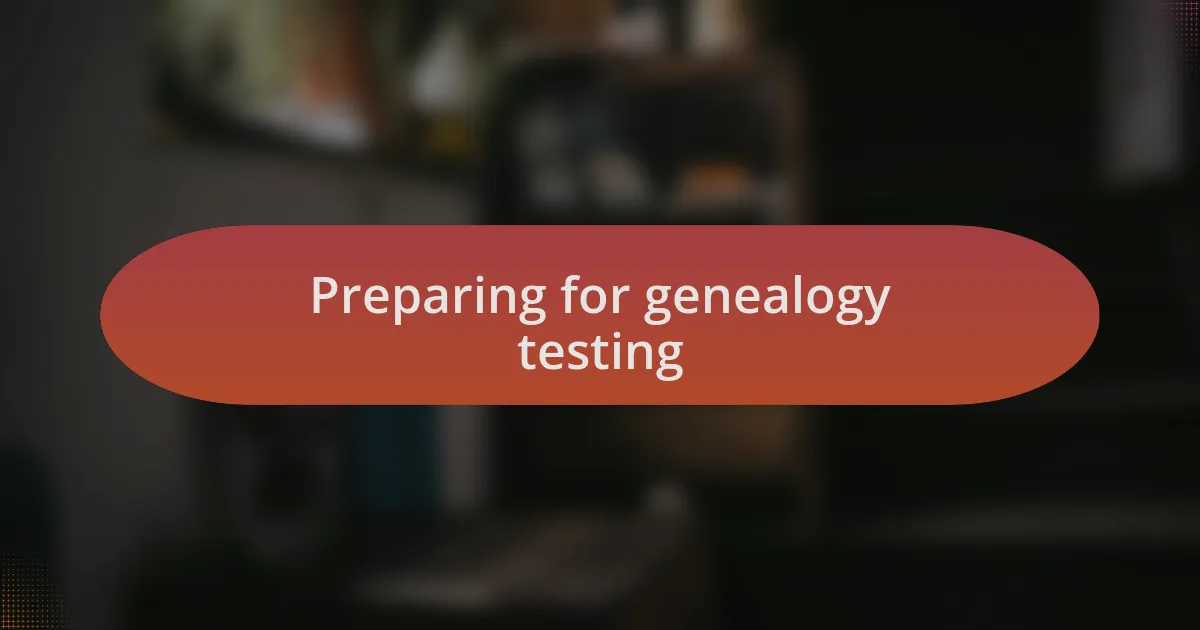
Preparing for genealogy testing
Before jumping into genealogy testing, it’s essential to gather any relevant family history information you might already have. I once spent an afternoon sifting through old family documents and stories, which helped me focus my testing goals. Have you ever considered how much more meaningful your results could be with a little background context?
Choosing the right test is another crucial step in your preparation. I vividly remember the moment I decided between Y-DNA and autosomal testing; it felt like standing at a crossroads in my family history. It’s worth asking yourself: what do you truly want to uncover? Understanding your motivations will guide you toward the best option.
Additionally, familiarize yourself with the testing process and what to expect. When I first received my test kit, the anticipation was exhilarating, but so was the uncertainty. Knowing the timeline for results and potential follow-up options alleviated my anxiety. Have you researched the turnaround times and support resources available? Being prepared can make the experience far more fulfilling.
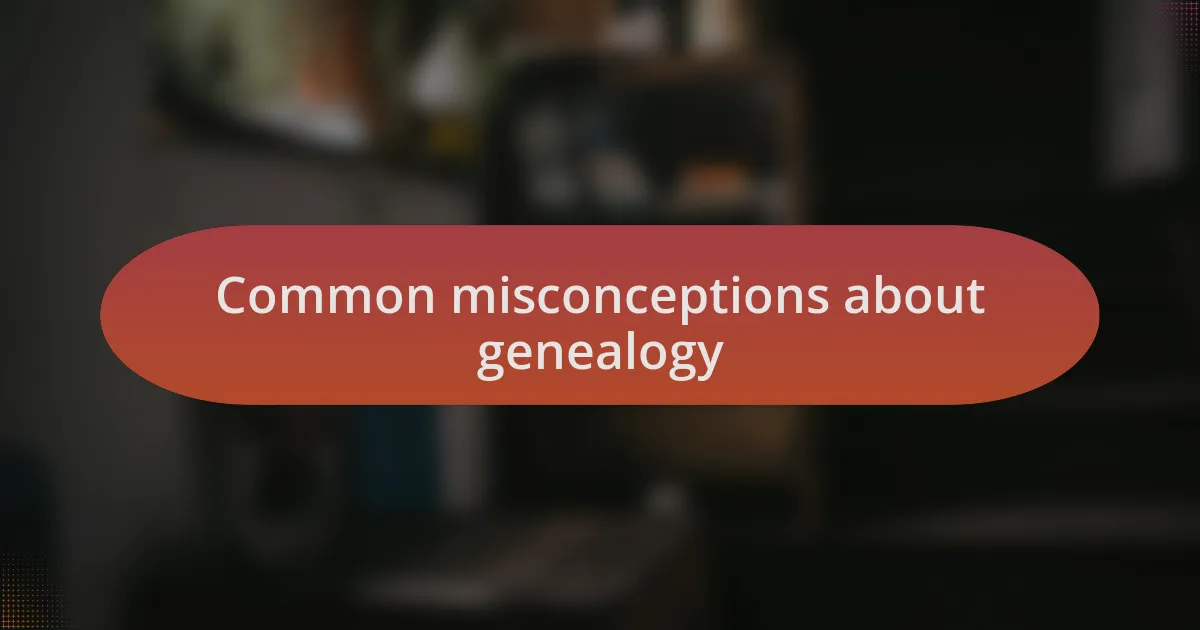
Common misconceptions about genealogy
Many people believe that genealogy is a straightforward path to discovering their family history, but that’s a common misconception. I once thought that a simple DNA test would unlock my entire ancestry, but I quickly realized the journey is much more complex. Have you ever felt overwhelmed by the vast amount of information and choices?
Another misconception is that all family histories are well-documented. I was surprised to find large gaps in my lineage, which made me appreciate the oral histories passed down through generations. It’s a reminder that our family stories are sometimes hidden, waiting to be uncovered. Have you shared these stories with your family, or are you relying solely on official records?
Lastly, many individuals think that the results of a genealogy test reveal definitive answers. My initial results came with more questions than I anticipated, leading me to new avenues of research. I learned that even the best tests can have limitations, especially when interpreting results. Have you considered how the context of each piece of information can change your understanding of your ancestry?
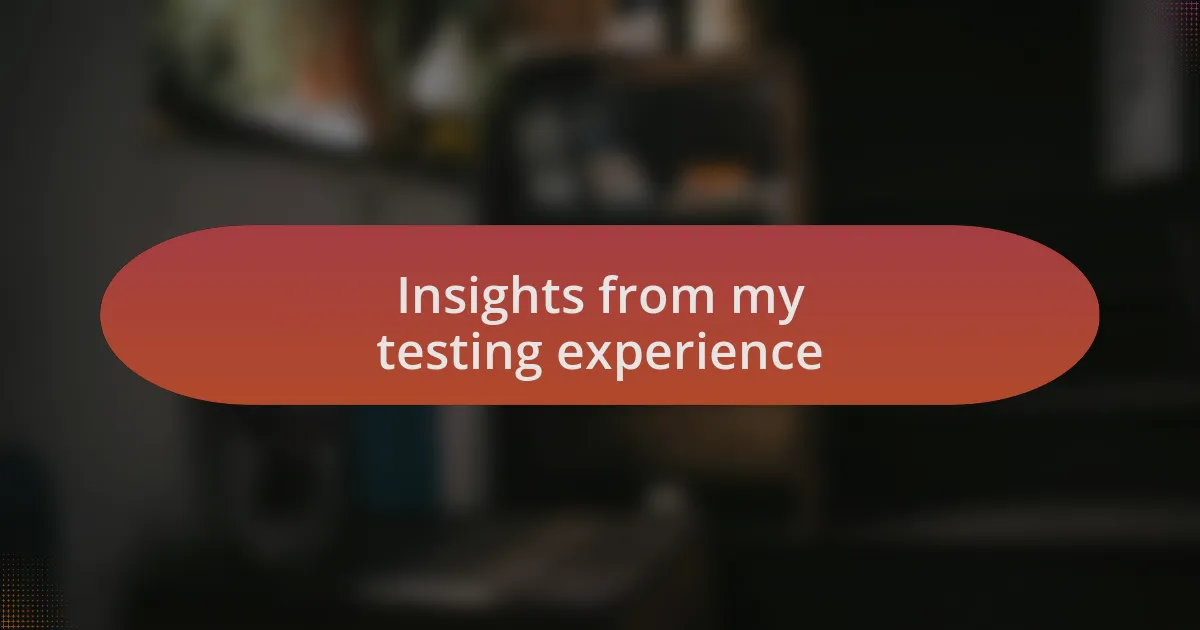
Insights from my testing experience
When I embarked on my DNA testing journey, one key insight struck me: every result tells a story. I remember receiving my ethnicity estimate and feeling a strange mix of excitement and confusion. At first, I thought this were the final puzzle pieces, but I quickly learned that they merely hinted at ancestral connections that were much deeper and richer than percentages could convey. How often do we rely on numbers to define who we are?
Another lesson emerged while I navigated online databases. I was initially thrilled to find a distant cousin who matched my DNA, but coordinating our research proved challenging. It made me realize that collaboration is a double-edged sword in genealogy; while it can lead to incredible discoveries, differing interpretations of shared information can create friction. Have you had to reconcile different views with family members when exploring history together?
Lastly, I uncovered how emotional this journey can be. I distinctly remember when I finally tracked down a long-lost relative who had vital information about my family. It wasn’t just about the facts; it was the raw, heartfelt connections that made the discovery worthwhile. Each conversation sparked reflections on our shared identity, reminding me of the importance of human connection in genealogy. How do our ancestral ties shape who we are today?
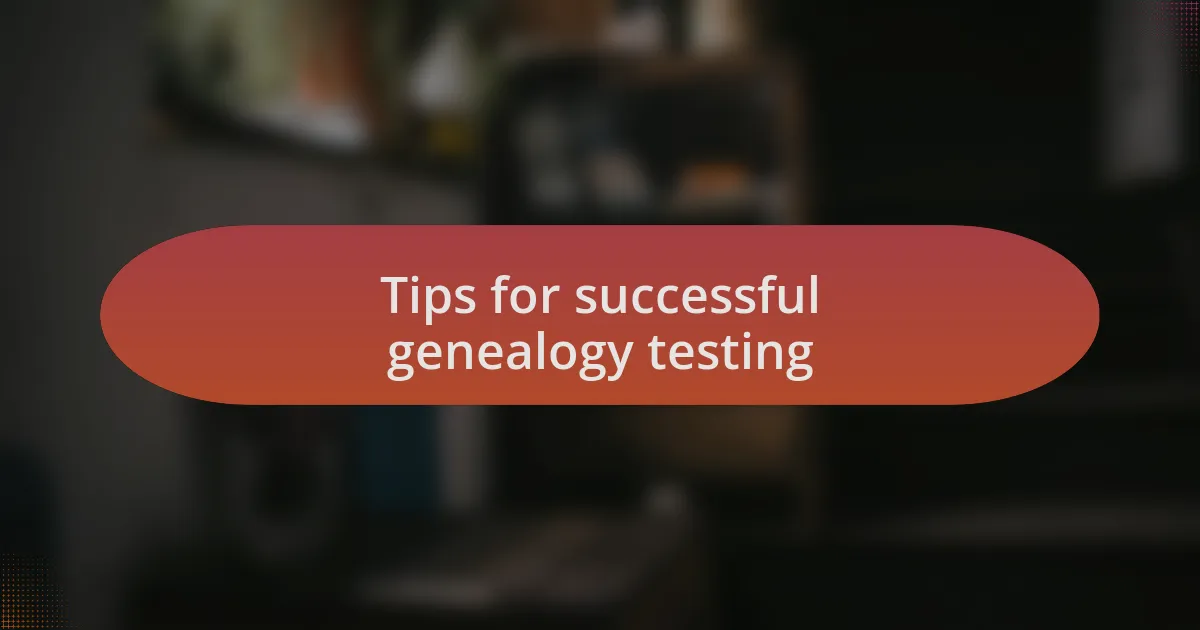
Tips for successful genealogy testing
One of my most valuable tips for successful genealogy testing is to take your time. In my experience, rushing to make sense of results often left me frustrated and confused. I remember when I first received my reports; I was eager to dive into every detail, but I later found that stepping back and giving myself a moment to ponder each piece of information led to much deeper understanding and insights. Have you ever felt overwhelmed by overwhelming data?
Another important aspect is to keep an open mind about what you might discover. I was surprised when I stumbled upon unexpected genetic matches that linked me to a side of my family I had never considered. Initially, I wrestled with the idea of embracing these new connections, but ultimately, this broadened my perspective on my origins. It’s fascinating how our family trees can extend in unexpected directions, isn’t it?
Lastly, ensuring that you maintain good documentation throughout your research process cannot be overstated. Early on, I neglected to organize my findings properly, which made it difficult to reference important connections later on. I eventually developed a system that suited my style, and it made all the difference in tracking my progress. Have you created methods that help simplify complex information in your own research?